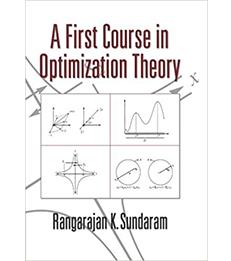Books
A First Course in Optimization Theory
—

By Rangarajan K. Sundaram
A First Course in Optimization Theory, first published in 1996, introduces students to optimization theory and its use in economics and allied disciplines.
The first of its three parts examines the existence of solutions to optimization problems in Rn, and how these solutions may be identified. The second part explores how solutions to optimization problems change with changes in the underlying parameters, and the last part provides an extensive description of the fundamental principles of finite- and infinite-horizon dynamic programming. Each chapter contains a number of detailed examples explaining both the theory and its applications for first-year master's and graduate students. 'Cookbook' procedures are accompanied by a discussion of when such methods are guaranteed to be successful, and, equally importantly, when they could fail. Each result in the main body of the text is also accompanied by a complete proof.
A preliminary chapter and three appendices are designed to keep the book mathematically self-contained.
To learn more, visit Amazon.
______
Rangarajan K. Sundaram is the Vice Dean of MBA Programs and the Edward I. Altman Professor of Credit & Debt Markets and Professor of Finance.
The first of its three parts examines the existence of solutions to optimization problems in Rn, and how these solutions may be identified. The second part explores how solutions to optimization problems change with changes in the underlying parameters, and the last part provides an extensive description of the fundamental principles of finite- and infinite-horizon dynamic programming. Each chapter contains a number of detailed examples explaining both the theory and its applications for first-year master's and graduate students. 'Cookbook' procedures are accompanied by a discussion of when such methods are guaranteed to be successful, and, equally importantly, when they could fail. Each result in the main body of the text is also accompanied by a complete proof.
A preliminary chapter and three appendices are designed to keep the book mathematically self-contained.
To learn more, visit Amazon.
______
Rangarajan K. Sundaram is the Vice Dean of MBA Programs and the Edward I. Altman Professor of Credit & Debt Markets and Professor of Finance.
